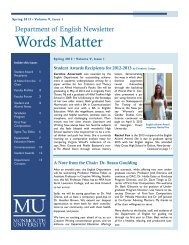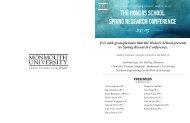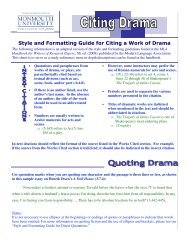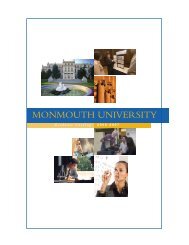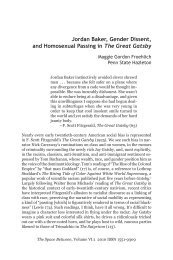students tout MU's - Monmouth University
students tout MU's - Monmouth University
students tout MU's - Monmouth University
Create successful ePaper yourself
Turn your PDF publications into a flip-book with our unique Google optimized e-Paper software.
ANINTERVIEW<br />
WITHBENJAMINRBARBER<br />
�<br />
BY SALIBA SARSAR<br />
WITH DOREEN BUCHMAN & IRENE FARRELL TOWT<br />
�<br />
MONMOUTH UNIVERSITY WAS HONORED TO HOST<br />
internationally renowned political theorist Benjamin R. Barber as a special guest speaker<br />
at the <strong>University</strong>’s 70th Founders’ Day ceremonies on October 8, 2003. He was also<br />
awarded an honorary Doctor of Human Letters degree at the celebration. Barber, who is<br />
the Gershon and Carol Kekst Professor of Civil Society at the <strong>University</strong> of Maryland,<br />
brings an abiding concern for democracy and citizenship to issues of politics, culture, and<br />
education in America and abroad.<br />
HIS 17 BOOKS INCLUDE THE CLASSIC STRONG DEMOCRACY (1984) AND THE<br />
RECENT INTERNATIONAL BESTSELLER JIHAD VS. MCWORLD. HIS ARTICLES HAVE<br />
APPEARED IN HARPER’S MAGAZINE, THE NEW YORK TIMES, THE ATLANTIC, AND THE<br />
NATION. BARBER’S MANY ACADEMIC HONORS INCLUDE GUGGENHEIM AND<br />
FULBRIGHT FELLOWSHIPS, AND HE HOLDS A CERTIFICATE FROM THE LONDON<br />
SCHOOL OF ECONOMICS AND POLITICAL SCIENCE AND A DOCTORAL DEGREE FROM<br />
HARVARD UNIVERSITY. IN THIS EXCLUSIVE INTERVIEW FOR MONMOUTH UNIVERSITY<br />
MAGAZINE BY DR. SALIBA SARSAR*, DR. BARBER SHARES HIS INSIGHTS ON<br />
RESPONSIBLE CITIZENSHIP, THE STATE OF AMERICAN POLITICS, AND THE FUTURE<br />
OF DEMOCRACY IN A GLOBAL SOCIETY.<br />
*<br />
ASSOCIATE VICE PRESIDENT FOR ACADEMIC PROGRAM INITIATIVES AND ASSOCIATE PROFESSOR OF POLITICAL<br />
SCIENCE, MONMOUTH UNIVERSITY<br />
�<br />
TELL US ABOUT YOUR CURRENT WORK IN PROGRESS, THE<br />
DECLINE OF CAPITALISM AND THE INFANTILIST ETHOS,<br />
WHICH IS SCHEDULED FOR PUBLICATION NEXT YEAR.<br />
W<br />
hen we look at our society and<br />
see the way in which we are trying<br />
to turn children into consumers and<br />
consumers into children, the way in<br />
which we are selling abroad an<br />
American culture intended for<br />
teenagers (fast food, fast movies, fast<br />
music), it becomes apparent that capitalism<br />
in this consumer age has abandoned<br />
the values of early capitalism—such<br />
values as saving and entrepreneurship<br />
and individual autonomy—and put in<br />
their place the childish values of a consumer<br />
society where doing whatever<br />
you feel, responding to impulse, takes<br />
the place of serious adult behavior.<br />
There has always been a tendency for<br />
societies to be seduced by the attractions<br />
of childhood, but generally the<br />
adult institutions of education, church,<br />
and state work to help us grow up.<br />
Increasingly, we are living in a society<br />
where the so-called adult institutions<br />
are anxious to keep us children. The<br />
media certainly work hard to infantilize us.<br />
FALL 2003 • <strong>Monmouth</strong> <strong>University</strong> Magazine 3



